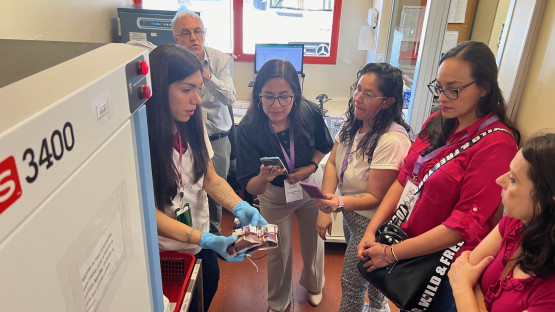The IAEA organized a regional training course on the safe delivery of blood irradiation services for health practitioners in Latin America and the Caribbean in November 2023. More than 30 national experts in haematology, biochemistry, physics, quality assurance and radiation technology gathered to update their knowledge, share best practices, and learn from each other’s experiences. A vital medical practice, blood irradiation decreases the risk that immune cells that are present in the blood that is being transfused attack the recipient body’s tissues as a result of the transfusion.
“Bringing together so many experts from different countries was a valuable opportunity to expand and update the entire region’s scientific and technical knowledge on providing safe blood transfusions for patients,” said Silvina Kuperman, Head of the Regional Hemotherapy Center at the Hospital of Paediatrics Prof. Dr. Juan P. Garrahan in Buenos Aires, Argentina.
For years, the irradiation of blood—or blood components such as plasma and red blood cells—has helped to decrease the incidence of transfusion-associated Graft Versus Host Disease (TA-GVHD), without any significant accompanying effects for the recipient patient. Cellular blood components are irradiated prior to transfusion to prevent the proliferation of viable T lymphocytes, which are the immediate cause of TA-GVHD. Patients at particular risk of TA-GVHD include foetal and neonatal recipients of intrauterine transfusions, selected immunocompromised recipients, recipients of cellular components known to be from a blood relative, and recipients who have undergone marrow or peripheral blood progenitor cell transplantation, amongst others.
“This workshop created a platform for a unique dialogue between blood policy authorities on the one hand and nuclear energy authorities on the other,” explained Fabiano Romanholo, Coordinator of Blood and Hemoderivatives products in the Ministry of Health, Brazil. “It enabled us to share different perspectives and learn from each other.”
Held from 27 to 29 November, the workshop was organized in the context of an ongoing four-year technical cooperation project that aims to increase the contribution of nuclear science and technology in addressing the development priorities of Latin America and the Caribbean. It was opened by representatives of the Ministry of Health of Argentina, the National Commission of Atomic Energy, the IAEA and the Pan American Health Organization (PAHO), underscoring its regional importance.
The course content included a review of the clinical indications for blood irradiation, international recommendations, and related scientific evidence. The participants heard about best practices in the field of blood transfusion—from the need to maintain safe temperatures (a cold chain) for the safe transport and storage of samples to the basic principles of hemovigilance (a set of surveillance procedures covering all aspects of blood transfusion).
During the training, participants also reviewed existing approaches to blood irradiation, including their advantages and disadvantages, safety and security, modes of use and preventive maintenance measures to prevent unplanned downtime caused by equipment failures. The attendees were also briefed on quality management practices in delivering blood irradiation services.
Overall, the workshop provided an excellent opportunity to train many specialists simultaneously, boosting regional capacity on the safe use of this important, life saving nuclear technology in a cost-effective way, as well as supporting peer learning and networking. In addition, it will help guide plans for future technology transfer and training courses in the region, in line with a key objective of the IAEA’s technical cooperation programme, which is to boost national expertise and knowledge in the safe application of nuclear technologies.






